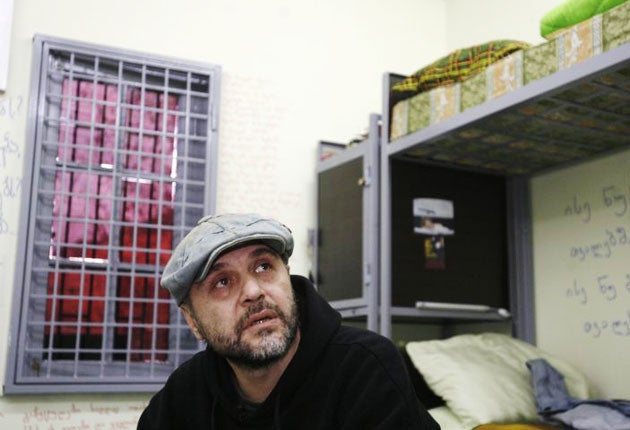The ‘prisoner’ versus the President
Georgia’s leader faces daily criticism on a TV show he claims to adore. Could it be his undoing?

Your support helps us to tell the story
From reproductive rights to climate change to Big Tech, The Independent is on the ground when the story is developing. Whether it's investigating the financials of Elon Musk's pro-Trump PAC or producing our latest documentary, 'The A Word', which shines a light on the American women fighting for reproductive rights, we know how important it is to parse out the facts from the messaging.
At such a critical moment in US history, we need reporters on the ground. Your donation allows us to keep sending journalists to speak to both sides of the story.
The Independent is trusted by Americans across the entire political spectrum. And unlike many other quality news outlets, we choose not to lock Americans out of our reporting and analysis with paywalls. We believe quality journalism should be available to everyone, paid for by those who can afford it.
Your support makes all the difference.As domestic pressure mounts on Georgia’s President Mikheil Saakashvili to resign following the short war the country fought with Russia in August last year, one man has turned opposition into entertainment, locking himself into a fake prison cell and vowing not to come out until the President gives up his job.
Giorgi Gachechiladze, a singer, poet and political satirist, is filmed 24 hours a day in his cell, which is inside a television studio, with the resulting programme broadcast live throughout the night and highlights shown every evening.
Cell Number 5, as the show is called, has become the talk of Tbilisi since it first aired one month ago and more than 150 people, including Georgia’s human rights ombudsman Sozar Subari and theatre director Robert Sturua, have appeared in discussion with Gachechiladze on the programme.
The star of the show comes from a family with a track record of pitting itself against the President – his brother Levan Gachechiladze was an opposition candidate in the last presidential elections which returned Mr Saakashvili to power in January 2008.
Mr Saakashvili has repeatedly said it is his intention to stay in office until his second and final term ends in 2013, meaning that Gachechiladze could be in for a long stay in “prison”.
“Saakashvili is becoming like Hitler or Stalin and we are fighting for democracy in Georgia through this broadcast,” Mamuka Glonti, head of Maestro Television, the cable station which broadcasts Cell Number 5, said.
Mr Glonti also said that he interpreted public comments made by the government politician Givi Targamadze describing those involved in Cell Number 5 as “drug addicts” and “Russian agents” as a threat. “I see his comments as a threat because this is how government figures used to describe Imedi TV,” he said. Imedi, which was part-owned by the tycoon Badri Patarkatsishvili and critical of the government, was raided and temporarily shut down by police in November 2007.
Mr Saakashvili’s detractors frequently include the lack of media freedom in Georgia as among their top concerns, but the President robustly denies these claims.
In a live question-and-answer session with members of the public broadcast on Georgian television recently, he cited Cell Number 5 as an example of the freedom the media enjoys in Georgia. He said he was a “devoted viewer” of the show. Amusing as Mr Saakashvili may find it, elsewhere he is facing increasing criticism and serious calls for his resignation, which was demanded in a declaration signed by 12 opposition parties in January. The former parliamentary speaker and one-time close Saakashvili ally Nino Burjanadze, who launched her own party last year, is calling for the opposition to bury their differences and together push for the President to resign by holding protest rallies.
Meanwhile, Irakli Alasania, who resigned as Georgia’s ambassador to the UN in December and is a respected figure in Georgia, has also called for the President to go. “Saakashvili must resign not only because he dragged the country into a provocative war, but also because he has no ability to bring the country … [out of] the current military-political and economic crisis,” he said recently on television.
Mr Alasania has formed his own political team and is in favour of holding a referendum on whether or not voters want early presidential elections.
However, Mr Saakashvili has so far resisted all attempts to topple him and insists he is focusing on rebuilding the country and bolstering its economy.
Join our commenting forum
Join thought-provoking conversations, follow other Independent readers and see their replies
Comments